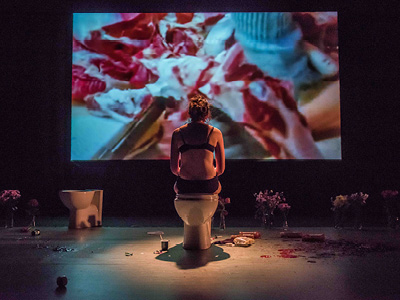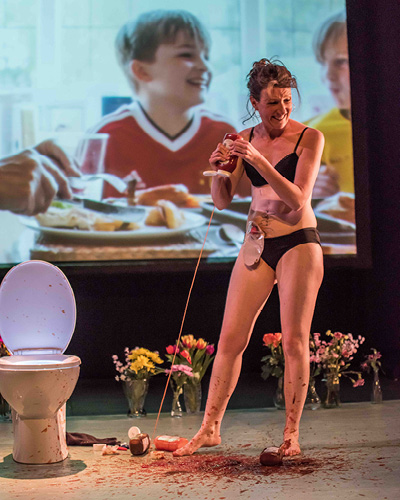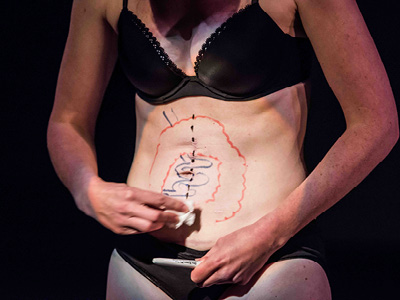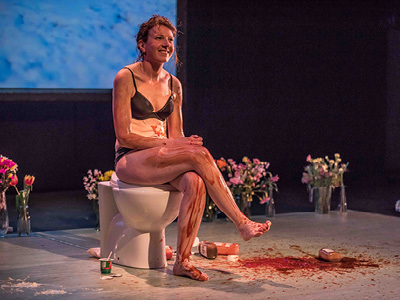Gutted is a love story about my real-life experiences as a young woman living with ulcerative colitis. It’s full of frank confessions, colourful characters and too much brown sauce.
Conception
Gutted is based on my own experiences. When I was in and out of hospital, I obviously had a lot of time off from my career as an actor, so I started to turn my experiences into characters and jokes. As I was writing these ideas down, I wanted to put them together as a show. But first I needed to know if people would find it funny and pay to laugh at my expense, so I decided to use them for a standup show. Luckily, I found audiences were able to laugh at those things.
Collaboration
 I was having trouble piecing these ideas together into a show on my own, so I enquired after someone else. I was living in London, and I had a friend who had a friend, Tara, who was a director with The Conker Group. Tara and I met up, and she asked me to do a bit of standup.
I was having trouble piecing these ideas together into a show on my own, so I enquired after someone else. I was living in London, and I had a friend who had a friend, Tara, who was a director with The Conker Group. Tara and I met up, and she asked me to do a bit of standup.
So, there I was, in Tara’s lounge at 10am, trying to do a standup routine and discuss my ideas. It was really embarrassing, but that’s how it started; and she said ‘yep, okay, I’ll take it on board and see if we can create a show, or the startings of a show’. Soon after the meeting, we heard from her connection at HOME Theatre up in Manchester, offering us a rehearsal space, and that’s where it all started.
Support
When researching and writing, we got in touch with IA: The Ileostomy & Internal Pouch Support Group, and they have been our supportive sponsors from the start. It’s been absolutely incredible; they’ve backed it wholeheartedly all the way through, including touring hospitals, going to the Edinburgh Fringe Festival and travelling to Denmark with it. We got in touch with various groups, and we had feedback from different nurses and patients. Although confidentiality rules meant we were not always able to use online patient forums, people were very helpful in person and happy to talk to us about their experiences.
‘if you don’t laugh you just cry’
Liz RichardsonI joined Crohn’s and Colitis UK when I learned I had ulcerative colitis. To be honest, I was reluctant to use it, as I struggled with the idea of belonging to a group I didn’t want any part of. I did always read the hope stories in their magazine, which made me go ‘one day I can do this’. One of the most exciting things for me has been to see myself actually featured in the same magazine. It felt like a great achievement and proof I’m going to get on with my own life.
Humour
There’s a relation between humour and illness. You’ll find a lot of people dealing with illness see the lighter side of things. Some not so much, but a lot of people I meet are able to laugh at themselves, or at least their situation, because, if you don’t laugh you just cry the whole time. I think people laugh at Gutted because they can connect to and sometimes see themselves in it. Whether it’s patients, or doctors and nurses who’ve been there, said it or seen the situation, or a general public who find the humour in the human nature of it all.
Stoma
When Tara and I started writing, we wanted to make my stoma into a character. When I had my temporary ileostomy, I didn’t like it. I didn’t want to be friends. Everyone kept saying ‘oh, you could name it’, but I didn’t want to acknowledge it being there. It was only later that I could look back and see all the potential for humour in my situation.
We were messing about, and Tara kept telling me to be free and just improvise. That was when I suddenly came up with this voice. ‘It was ridiculous—too ridiculous’, she said, ‘we can’t put it in!’ But we did, and no matter where we perform it, the most popular character is always Stoma, even with people who’ve never heard of one before. I’m glad I got to keep my stupid voice in there.
Beer and cake
 Writing the show, I found I could do all these voices in my head for just about everyone, but I couldn’t find a voice for those closest to me, my mum and my boyfriend, Luke. I just couldn’t do an impersonation; it was impossible.
Writing the show, I found I could do all these voices in my head for just about everyone, but I couldn’t find a voice for those closest to me, my mum and my boyfriend, Luke. I just couldn’t do an impersonation; it was impossible.
Tara wanted us to engage with the audience, or, using the cheesy theatrical term, break down the fourth wall. So, we decided to get the audience play my mum and Luke, we just needed to entice them. As we project images of my mum baking, and Luke’s favourite thing is beer, we tried offering test audiences a bottle of beer or a cake. It worked, and people felt more comfortable to come down if they thought there was a reward in it.
Yoghurt
We had an amazing little team, with designers for sound, lighting and background visuals. For the stage, Tara and I came up with the three toilets, a row of thankyou cards and lots of ketchup and yoghurt. Each show, I get through about 15 yoghurts. It’s a funny thing to ask a stage manager for. I only eat five or six of them; the rest end up, along with the ketchup, on me and on the huge, heavy lino mat that travels around with us.
‘it’s a funny thing to ask’
Liz RichardsonI have to have the same flavour now, as I used to keep getting a surprise one. I’d come off the show tell the stage manager to please not put a peach melba in there, as they make me feel sick. We now go with strawberry most of the time. Surprisingly, yoghurts don’t make me sick. Although I don’t eat them in my day-to-day, it hasn’t put me off for life. It’s the same with ketchup; people do ask if I can still use it, but it’s not put me off. I disconnect from it.
Courage
 In the show, I never actually play myself, so I end up putting across some of my personal points of view through other characters. I would often express to my friends and family how I didn’t like everyone telling me I was brave. When you’re ill, you aren’t being brave, you’re just getting on with it, because you haven’t got a choice.
In the show, I never actually play myself, so I end up putting across some of my personal points of view through other characters. I would often express to my friends and family how I didn’t like everyone telling me I was brave. When you’re ill, you aren’t being brave, you’re just getting on with it, because you haven’t got a choice.
In the play, I gave this line to Jasmine, my friend, who appears via Skype. Actually, when we met in hospital, she spent most of the time in hospital crying over this awful boyfriend who would come in and be completely unsupportive. She’s Australian and was working in London, when she became very poorly and was diagnosed with Crohn’s. Sadly, this meant she couldn’t support herself, and she had to leave London. Until her parents flew over to bring her back to Australia, there was a week when we only had each other. We became really close, and we’ve kept in touch ever since. When I told her I was making a show, she was so proud she cried about it. I think the lovely personality I got to know on the ward really comes through in her Skype appearance.
Expression
 I’ve always had to express myself in one way or another; I’m not someone who keeps things to myself. Looking back, it only felt natural that this was how I dealt with my illness. After illness stopped my career, I had to turn that on its head and intertwine them.
I’ve always had to express myself in one way or another; I’m not someone who keeps things to myself. Looking back, it only felt natural that this was how I dealt with my illness. After illness stopped my career, I had to turn that on its head and intertwine them.
‘I’m not someone who keeps things to myself’
Liz RichardsonWriting the show was a form of therapy, almost like counselling myself. I must have cried however many times reflecting on my illness and reliving what I went through. Tara was very sensitive in helping me going through it all. Now it feels like it’s something I’ve gone through and dealt with.
There’s been a huge wave of people doing plays about illness, especially mental illness. Mental health awareness was popular at the Edinburgh Fringe last year, and there was lots about fertility. A few people have approached me to say they’ve been writing about their own experiences in whatever artform they practise; it is definitely a natural go to for dealing with illness, especially if you’ve got a creative background.
Touring
We had two sell-out runs at the Home Theatre in Manchester, followed by a tour of loads of different UK hospitals. We then did Edinburgh Festival and went to Copenhagen for the European Ostomy Association Annual Conference. Invitations to hospitals and conferences keep coming up, but I’m probably drawing a line under it all come the end of the year.
Before that, we’re due to start a new UK tour of theatres and hospitals we missed last time, from late October into November. The script is about to be published by Bloomsbury, in time for the tour so people at the show can buy a copy. It’s really exciting that it’ll be out there in the world and anyone can pick it up and read it or put it on if they want to.
Reception
We’ve had an unbelievable response, with interviews and great reviews at Edinburgh, as well as people writing messages, tweets and emails. It’s been very touching and very moving.
Although 99% of people have actually loved it, we had one bad response, and that was it—not bad for such an out-there show. Somebody in Edinburgh emailed us to say they were shocked, it was disgusting, they had no idea why we would laugh at this and they would be telling people not to see it. It’s like they completely missed the point of what we were trying to do. We weren’t laughing at people; I was putting myself out there, so people could laugh with me. We didn’t feel any need to respond.
We get a lot of laughter, and we’ve had a lot of people crying during the shows. There are lots of tears in hospitals, of course, but also theatre goers who don’t know a lot about ulcerative colitis or stomas can still connect to illness in some way, shape or form. All in all, we’ve had a very positive response.
For links to buy tickets, go to:
www.theconkergroup.co.uk/gutted
25 Oct Lighthouse, Poole
26 Oct Bristol Royal Infirmary
27 Oct Royal Devon and Exeter Hospital
30 Oct Lawrence Batley Theatre, Huddersfield
31 Oct Clwyd Theatr Cymru, Mold
1 Nov York Theatre Royal
3 Nov Rosehill Theatre, Whitehaven
6 Nov Kent and Canterbury Hospital
7 Nov Maidstone Hospital
9 Nov Square Chapel Arts Centre, Halifax
10 Nov Theatre Deli, Sheffield
Water
Gutted gave me the confidence to collaborate with other people. I’m now talking to a couple of theatres and theatre makers about creating a new show together. This time, it won’t be a one-woman show or based on my own experience; all I’ll say is that it’s about water.
Liz Richardson trained at East 15 Acting School and performed with The Factory for 6 years before cocreating the play Gutted
Website

